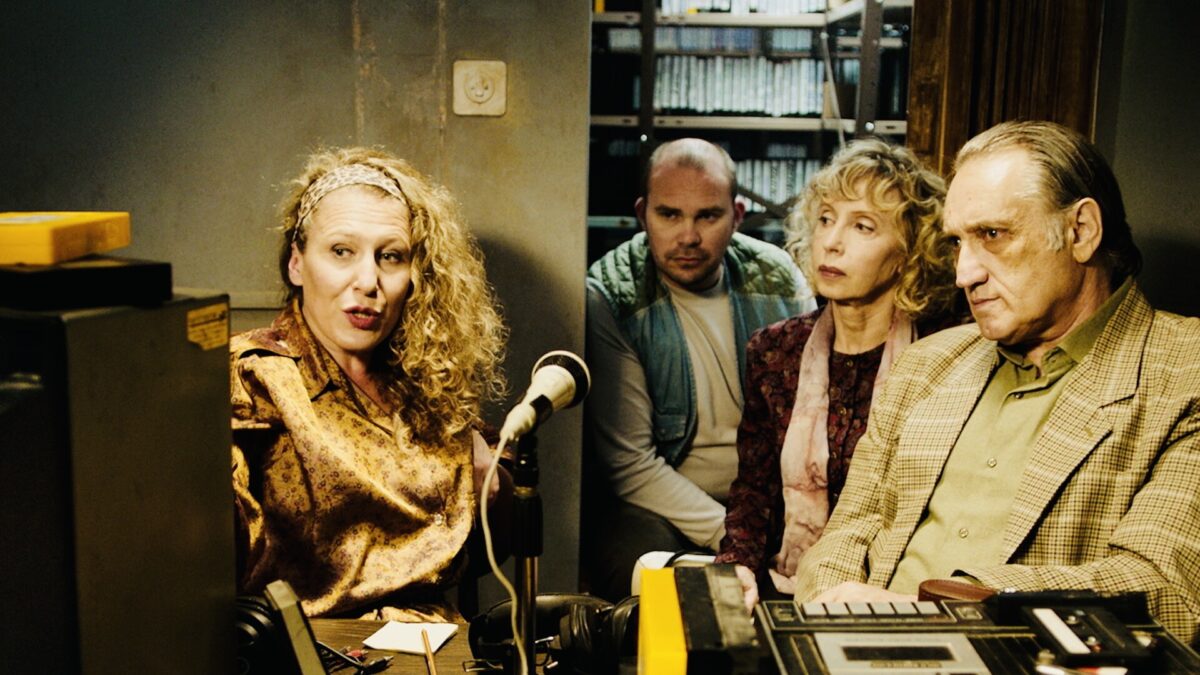A plane touches down at Ben-Gurion Airport in September of 1990. The passengers are Russian Jews starting a new life in Israel. Victor and Raya Frenkel, an elderly childless couple, are among these immigrants.
And so begins Golden Voices, an endearing Israeli drama by Evgeny Ruman about displacement and adjustment. Infused with comedic touches, it unfolds in Russian and Hebrew.
Ruman’s movie, screened online by the Calgary Jewish Film Festival, focuses on the Frenkels but is broadly about the trials and tribulations of Jews from the now-defunct Soviet Union who settled in Israel from the late 1980s onward.

New Soviet immigrants faced a litany of challenges, from learning Hebrew to finding employment. But nearly all of them were buoyed by the prospect of living in Israel. As Victor (Vladimir Friedman) says shortly after he and Raya (Maria Belkin) settle into their $500-per-month apartment in Tel Aviv, “We are finally here in the Holy Land, making a fresh start.”
Victor and Raya were reasonably successful in the Soviet Union, having dubbed foreign movies into Russian. But now they can’t be sure what the future holds.
Victor’s old friend, well established in Israel, is an admirer of his dubbing skills. “You turned Kirk Douglas into a great actor,” he marvels, referring Victor’s ability to successfully project Douglas’ persona in the Hollywood blockbuster Spartacus.
Victor appreciates the compliment, but what he really needs are the income and stability of a steady job. He hopes to do radio plays in Israel based on movies he dubbed back in the Soviet Union. Judging by his friend’s reaction, Victor would be better off in a different line of work. It’s not easy being an immigrant in a country where the language and the culture are so alien.
Adjusting to reality, Victor and his wife enrol in an ulpan to learn the rudiments of Hebrew. Raya is keen and upbeat, but Victor is glum. This is not what he expected.
Raya, answering a newspaper ad seeking a woman with a pleasant voice, applies for the position in a dilapidated building where women in cubicles moan, sigh and talk dirty. It’s a phone sex business run by a no-nonsense woman. Raya is offered a good hourly salary, but she walks out in disappointment.
Victor, in the meantime, accepts a menial job going from house to house pasting posters on doors. Physically demanding for a man of his age, it leaves him with blisters on one foot.
Friedman and Belkin are convincing in their respective roles, giving viewers a taste of the hardships that freshly-arrived immigrants usually experience in Israel.
Desperate for employment, Raya returns to the phone sex facility In her first conversation with a client, she masquerades as a 22-year-old virgin. She succeeds in bringing the customer to a climax. From that point onward, she pretends to be Margarita, a 32-year-old well endowed brunette. By turns demure and coarse, Belkin delivers a credible performance as a reluctant vixen. Being ashamed of her job, Raya informs Victor she is selling perfume.
With Iraqi missiles raining down on Israel in the first month of 1991, Victor agrees to produce a public service announcement advising Russian immigrants on how to keep safe during the first Gulf War. To his consternation, he learns it is a non-paying position. “It’s for the country,” his old friend says.
In a scene tinged with humor and sadness, Victor phones the sex service and Raya answers. Recognizing her voice, he makes a decision that affects their relationship.

By chance, Victor wanders into Sputnik, a Russian video store, and discovers that the films he dubbed are for rent over the counter. When Victor identifies himself as the voice in a video, the owner of the shop offers him a job dubbing films into Russian. It’s illegal under copyright laws to reproduce films and dub them, but this is a matter of no concern to Victor.
In the meantime, Raya continues spinning sexual fantasies in her booth. Emotionally attracted to one of her clients, she agrees to meet him in person.
Circumstances compel Victor and Raya to make the kind of compromises and sacrifices they might not have considered in the Soviet Union. Ruman sympathizes with their plight, producing an empathetic film that provides viewers with a keen understanding of the travails that new Russian immigrants face in Israel.
